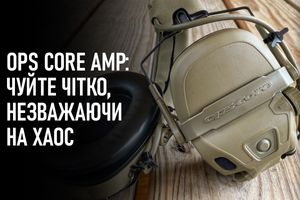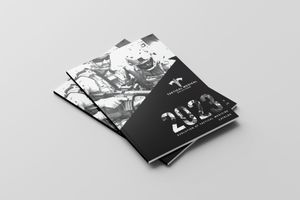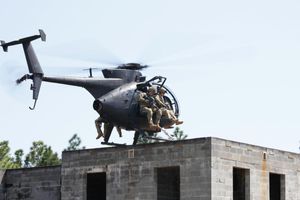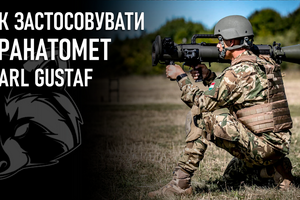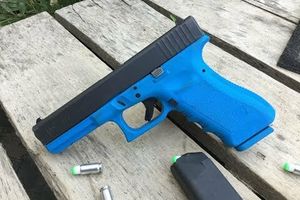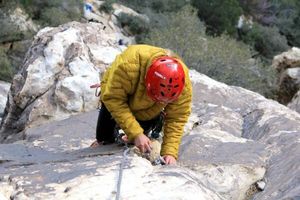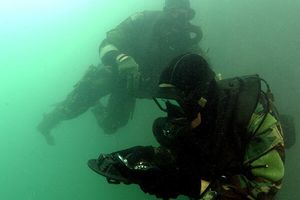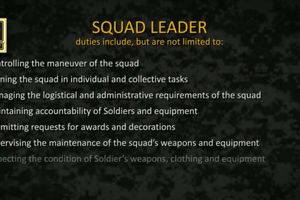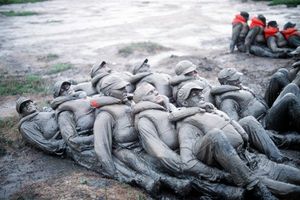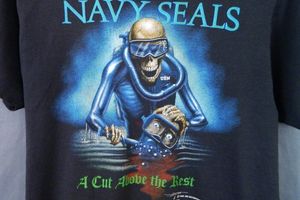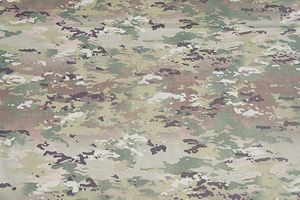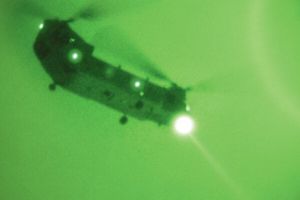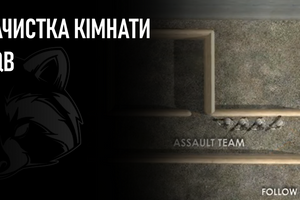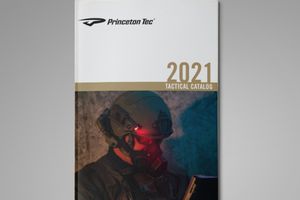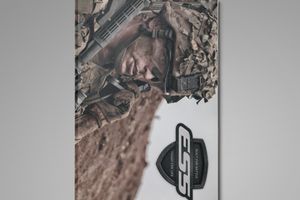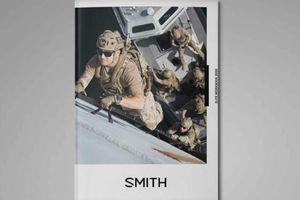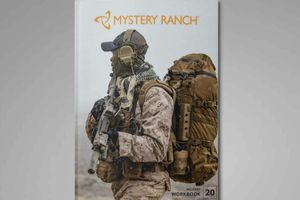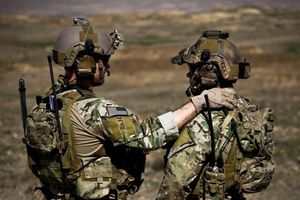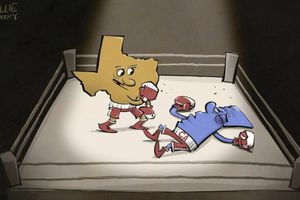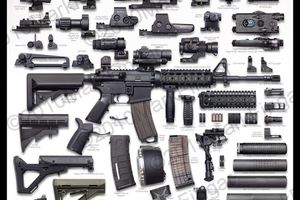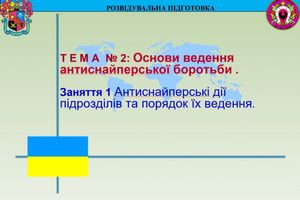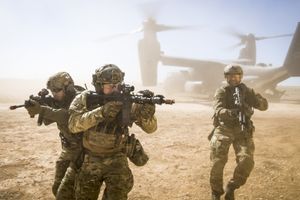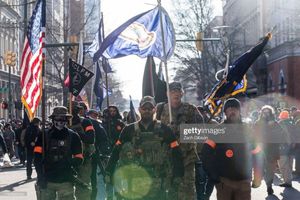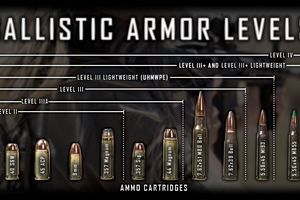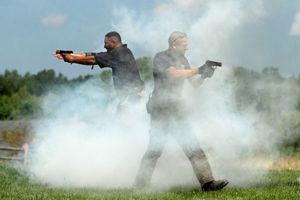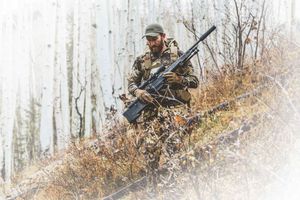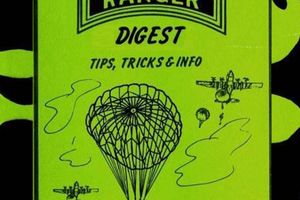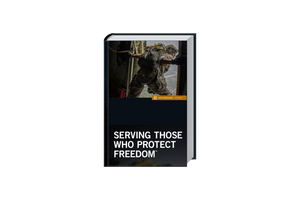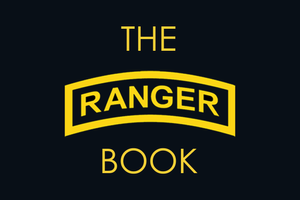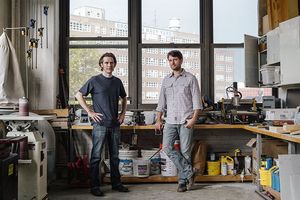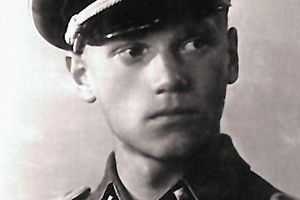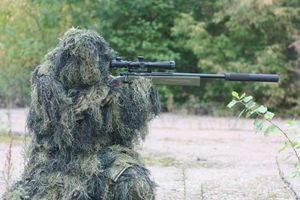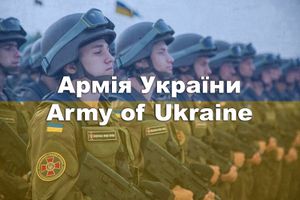Previous Chapter 5: Safe Return Doubtful Mind-set
I stood in the operations center staring at a massive flat-screen TV. Next to me, Scott scratched at his beard and shook his head.
“Something isn’t right with this,” he said.
Scott was one of the older guys on the team. He’d been around enough to know what “right” looked like.
It had been roughly nine years since those first days of training and my first combat deployment in Iraq. The war had moved to Afghanistan and then back to Iraq and finally back to Afghanistan. I’d been on hundreds of missions and hit all kinds of targets. I’d been doing this long enough to know a good target, and nothing about this target made sense.
The compound on the monitor showing the drone’s feed looked like every other biscuit-colored house in Afghanistan. The walls—made of rocks and mud—were ten to twelve feet high, with a metal gate. The compound sat in the middle of an open field with farmland all around it. A line of trees bordered the field on one side. Several smaller compounds sat less than half a kilometer away.
No children played in the field. We didn’t see any women outside working in the courtyard. No one came in or out of the house. There were no goats or cows around grazing. No men in the nearby fields. The house looked deserted, except that we knew it might contain a high-level al Qaeda commander.
At this point in the war, it was rare to find an al Qaeda commander in Afghanistan. We were mostly tracking and killing little “T” Taliban fighters, who moonlighted between farming and getting their jihad on. The big “T” Taliban leaders were based across the border in Pakistan, where they stayed just out of reach. A legitimate bad guy was smart enough to know better. If an al Qaeda commander was hiding in the house, where was his personal security? No one came to the house to get orders or visit him. Why would an al Qaeda commander come across the border with no security and hang out in a deserted house?
It didn’t add up. Scott was dead-on. This target had to be a trap.
It was a conclusion any of us could draw from our shared experience. For the last several years, special operations forces had been hunting Taliban and al Qaeda commanders and bomb makers. We’d determined their pattern of movement and waited for the perfect opportunity to strike. Once the target location was set, we’d move in and take them out. We had been doing it so long we’d started to think of it as a frustrating campaign of whack-a-mole. Each time we cut the head off of a bomb cell, another leader popped up. We weren’t stopping the insurgency; we were just killing it off in parts. An insurgency doesn’t have to win. It just has to survive.
I cared only about practical matters—the safety of my team, the number of expected enemy fighters, our route in and out. By this time we had plenty of practice playing the game, and a change in the pattern like this one was a major red flag for us all. The thirty thousand–foot strategy mattered little to me when I was eyeing a target. The strategy stuff was for the admirals and the politicians, not for the men on the ground.
Our theater commander decided we would hit the house. He was an Army Ranger colonel on a three-month rotation, and he saw the chance to kill or capture a high-level al Qaeda commander.
“He wants to check the ‘killed an AQ commander’ box so he can be a general,” Scott joked. “Go get ’em, boys, right?”
At the time, I was upset by the order. Taking down a high-ranking commander with a unit under his command always looked good. But I suspect the Ranger colonel could read the pattern as well as we could, and just wanted to be certain an al Qaeda commander wasn’t there. We were all fighting the same enemy, and he was doing what he thought needed to be done. It’s extremely hard not to get emotional in situations like this, especially when people don’t trust you and the stakes are so high.
As I matured through my career, I learned communication was one of the most important things I could provide to leaders and subordinates alike.
Our troop commander did his best to explain our issues with the mission to the Army colonel, but it didn’t work. The troop commander was our highest-ranking officer. While the troop commander was important to our unit, he had likely just graduated from the training pipeline. The troop chief, on the other hand, had been with the command longer than the officer had even been in the Navy. The troop chief was the senior enlisted SEAL in the troop. He was pretty much the Mafia don, or the big cheese. Because experience is what matters most, it was the senior enlisted guys who ran the command.
Both the troop commander and the troop chief told the Ranger colonel we’d seen a few similar houses on previous deployments. The houses were rigged to explode when we arrived.
Because we shared Afghanistan with the Rangers, the commander in charge of the theater rotated every three months between a SEAL and a Ranger officer. It wasn’t the perfect solution because culturally, SEALs and Rangers were on opposite ends of the spectrum, and so one side or the other was always trying to adapt to a commanding officer with a much different style than the troops were used to. We all had the same objectives, but the way we go about our business is vastly different.
The Army has certain institutional ways of doing things, just like the Navy. The difference can be boiled down pretty easily: Rangers think and plan from the top down. The SEALs think and plan from the bottom up.
Typically when we plan an assault, the enlisted team leaders and troop chiefs take the lead. We are trained to be free thinkers, not robots. The Rangers were very much the opposite. The Ranger commander would say, “I want to hit that target tonight,” while a SEAL commander might say, “OK, guys, what do you think? Is this a target worth hitting tonight?”
Every guy in my squadron had been in the SEAL community a minimum of five years. Our guys were older and much more experienced, and we’d built trust both up and down our chain of command through years of combat.
Of course, the Rangers were also deploying and growing their combat experience, but they were typically much younger. Most of the Rangers were twenty years old or younger, compared to the average age of about thirty-one years old for the SEAL team.
The biggest difference was trust, and it hadn’t been established at this point.
My team considered the target and its mysterious stationary cell phone signal, and it didn’t add up. Our instinct was to continue to monitor the target before conducting a raid. There wasn’t any significant movement on the target at all. But nothing we said resonated with the Ranger colonel. It seemed like he didn’t trust us to make the call, even though we felt like we’d earned it. The order came down from the colonel to launch and conduct the raid.
“Fucking sweet, another armchair quarterback telling us what to do from miles away,” one of the team leaders said.
“Well, at least it’s not life or death,” I said with a smirk as I walked out of the room.
At that moment, any trust we had in the Ranger colonel was gone. He wasn’t listening to what we had to say. Any logical argument we made to wait and monitor the target for additional time was dismissed.
We gathered in the operations center to go over the plan one more time. Usually when we got missions, there was a little excitement. We joked that deployments were like minimum-security prison sentences because you were stuck in a camp and served the same shitty food that convicts ate back in the States, and you couldn’t leave the wire without orders. Anytime we got to leave the wire it was better than sitting around camp, even if it meant you could get shot.
When I got to the operations center for the final brief, it felt like a cloud hung over this mission. I figured at best this was a dry hole and a waste of time. At worst, it was a setup and we were headed into an ambush.
“OK, boys,” the troop chief said. “We’re going to land on the Y instead of patrolling to the compound. Our hope is that the noise will stir up some commotion inside the compound and we’ll actually be able to see some signs of life.”
“Landing on the Y” meant that we would take a helicopter in to a spot near the target, just outside of RPG range. Instead of landing outside of earshot and sneaking in, we were hoping that the noise of the helicopters would spook the people in the house, causing them to run.
Of course, even if we did detect movement, it didn’t mean there wasn’t a chance that the people on the target weren’t all wearing suicide vests. We weren’t too thrilled with the plan, but we didn’t have much choice.
“This is the world we live in, this is our job, and we’re going to do everything within our capabilities to make sure we do this right and that nobody gets hurt,” the troop chief said.
I’ve heard one of my SEAL mentors say that there are rules about bitching. He said everyone has the right to bitch about a mission or job for five minutes. After those five minutes, you shut the fuck up and get to work. We got the full five minutes before we rode out to the helicopters in two small buses.
I didn’t have time to dwell on the commander’s decision as the bus bounced along the gravel road leading to the flight line. I wasn’t thinking about the Ranger colonel. I wasn’t thinking about how I was pissed that he was making us do this and putting us in a shitty position. I simply tried to focus on my three-foot world. My job wasn’t to complain; my job was to clear that compound under the orders we were given. We could talk smack about the colonel’s bad decision once we survived the mission; get distracted by it now, and we might not.
I sat cradling my suppressed HK MP7 in my lap. On my side, I was carrying a cut-down M79 grenade launcher. Our armorers had cut the barrels down shorter, cut the butt stock down into a pistol grip, and attached small red dot sights on top for more accuracy. I would always carry the M79, or “pirate gun,” when I carried the lighter and less lethal MP7. If I had to engage any enemy past one hundred and fifty meters, I would have to use my M79.
All my gear was desert digital camouflage, or, as we call it, AOR1. My OCD tendencies required me to color coordinate everything. I’d learned my lesson with the parachute jump gone wrong years before. I’d been worried about bad-fitting gear and not focused on the jump. Tonight, all these years later, my gear felt like it was part of me. Tight, clean, streamlined.
Sitting across from me in the helicopter, the snipers had collapsible ladders at their feet. The ladders allowed them to climb the walls surrounding the compound and provide covering fire. Everything was set. We were ready. I just hoped as we landed that I’d hear reports from the drones flying overhead that they were seeing movement on the target.
I could hear the engines whine as we started to land. The ramp was already open as all of us anxiously waited for the helicopter to come to a stop. We jerked to a halt as the wheels touched down and settled into a huge cloud of dust. The troop chief and troop commander were both on the radio with the drone circling above.
“Negative movement,” I heard the troop chief say over the team net. “I repeat, no movement on target.”
Either the Taliban had learned some serious discipline or no one was home, I thought as I raced down the ramp.
My mind was pinging as I followed my teammates off the bird. I was ready for a fight. I half hoped and half expected to hear the familiar rattle of AK-47 fire or the whoosh of an RPG. Once I cleared the dust cloud from the helicopter’s rotors, I took a knee and waited.
We formed a large “L” around the compound and listened to the noise from the helicopter. There was nothing but silence as the last thump of the rotor faded. No one ran. There was no yelling. Everything we did was slow and methodical. There was no hurry.
Why rush to a gunfight or ambush?
There was little moonlight, but under our night vision goggles the area looked like a green moonscape. I could see the walls of the compound a couple hundred meters away. The ground was rutted, dry, and dusty. It didn’t look like any farmer had touched the field in a while. My eyes traced the compound’s wall to the corner and then tracked into the wood line nearby. We often found fighters in the trees, but none of the drones spotted anyone either before we arrived or after the helicopters departed. I half expected to find the fighters holed up outside waiting to ambush us as we hit the house. If this were a legit target, the al Qaeda commander’s bodyguards would definitely be nearby.
From above us, the drones still weren’t seeing any movement. The only activity was two heat sources—people, likely men—standing on a rooftop that was well over five hundred meters away. The men could have simply been innocent farmers awakened by the noise of our helicopters, or they could be spotters for a possible ambush.
I watched as our snipers out front slowly crept across the field toward the compound walls. They got to the base of the wall, extended their ladders, and climbed up into their overwatch positions. From the snipers’ vantage point, they could see inside the walls and cover us as we approached.
We held our position until one by one, all the snipers checked in over the radio. They all had the same report: “Negative movement in the compound.”
“Snipers, good copy,” I heard the troop chief say over the net. “Assault element, commence assault.”
I was part of the assault team and near the front of the formation. I could see Scott in front of me. Slowly, I started to move toward the compound. I picked my way over the loose dirt and massive rocks.
“Still no movement,” the troop chief said as he relayed information from the drones and snipers.
When I got to the wall, I followed my teammates around to the front of the compound. Scott got to the gate first. As I closed in behind him, I could see that the gate had actually been left open just a small amount, just enough to be inviting. The only thing missing at this point was the welcome mat laid out in front for us to wipe our feet on before we entered.
Scott searched around the gate for booby traps. He looked quickly around the courtyard to make sure no one was waiting and then slowly pushed the gate open a bit further, constantly scanning the courtyard.
There was no reason for talking, let alone some crazy commando hand and arm signals. We’d all worked together for so long, we knew Scott was working his magic, and when he was ready he would let us know. He finally waved us forward and we lightly stepped over the doorjamb and into the compound.
I brushed by him and entered the courtyard. Just inside the gate to the left were two doorways leading into the small one-story main house. An animal pen was on the right side of the compound and in the far corner. It was empty.
I crossed the courtyard and followed my teammates toward the house. Ahead of me, one of my teammates was pushing in the wooden door of the first room. I could see the light spilling out of the room as I moved toward the second door.
“If they have lights on, that must be a good sign,” I thought. Typically that meant someone was home. Not many houses in Afghanistan have electricity, let alone enough to leave the lights on when no one is around.
I stopped at the second door and waited for a squeeze from one of my teammates confirming he was behind me.
“Take it,” my teammate whispered, squeezing my shoulder.
Using my left hand, I slowly opened the wooden door. It was stuck on its old hinges and let out a loud creak as I pushed it open. The house smelled of dust and not the usual Afghan potpourri of animal dung and cooking oil. The room was completely dark.
Before entering the room I scanned for any movement. The room was empty. Most Afghan houses are full of junk strewn everywhere. There is always stuff—blankets, crates full of rusted parts, used cans of cooking oil—in every room you enter. This room was completely empty except for a piece of cardboard in the center of the floor.
I wasn’t sure it was cardboard at first. It was hard to tell through my night vision goggles. It just seemed out of place, especially since it was such a new piece of cardboard. It’s very rare that you ever see anything new in Afghanistan, so seeing what seemed to be a brand-new, clean piece of cardboard in an empty room was a huge red flag.
“Hold up,” I whispered to my teammates behind me.
I reached down and picked up one edge. The cardboard was covering some sort of hole. I could see the edges as I picked the cardboard up a little more. It was hard to see in the hole. A sharp fin caught my eye and I followed it down to the fat body of a bomb.
The bomb was gray with American warnings and markings. The hole in the floor was deep enough that the fins at the back of the bomb were flush with the floor. I let the cardboard go and moved back from the hole.
Before I could say anything or even warn my teammates, I heard someone outside in the main courtyard start yelling.
I was milliseconds from calling myself after spotting the bomb under the cardboard. For all I knew, the bomb was rigged to blow remotely.
I found out later that my teammates in the first room with the light on had entered another empty room. A single lightbulb hung from the ceiling. Directly under the light was a rug on the floor. Centered on the rug were two RPG rockets lying in an “X.”
At about the same time I discovered the bomb, they found the RPG rockets.
We’d been set up.
Behind me I could see my teammates heading for the main gate of the compound. As silent and slow as we were coming in, we were the opposite getting out.
Scott was still at the gate when I arrived. He’d stayed there to pull security when he saw a pair of wires running from the gate into the ground. The gate was rigged to explode if it was opened fully. I was glad he’d inched it open only as far as he needed to. The gate confirmed what we knew already.
The phone.
The rockets.
The gate.
The compound was one massive bomb set to explode when we arrived.
Scott started the call when he saw the wires attached to the back side of the gate. He didn’t want the gate left unattended because someone could have inadvertently triggered the bomb. As each assaulter sprinted past him and out of the compound, he very carefully controlled the door to keep it in the safest position possible.
I carefully squeezed through the open door and broke into a dead sprint into the nearby field. I don’t think I’d ever run that fast in my life. It was the speed of fright. I made it back to where we got off the helicopters and took a knee near a small ditch. My mouth was completely dry, and I took a pull off my CamelBak, spitting a mouthful of water into the dirt. Scott stayed in place directing traffic until everyone had exited the compound. He was the last one to carefully step through the gate and begin his sprint away from the compound.
“I need a head count,” the troop chief said as he worked his way down the line.
I was part of Alpha team. I could see my team leader moving around trying to identify every member of the team. We all looked the same through night vision, so I trotted over and checked in with him. He gave me the thumbs-up and walked over to the troop chief.
“Alpha is up,” my team leader said.
I went back to my spot in a shallow ditch. The radio came to life again and I could hear the chatter as the troop commander and troop chief started working on approvals for an air strike with our joint terminal attack controller (JTAC).
Overhead, two A-10 attack fighters were circling. I could hear the faint crack of their engines as they got lined up to bomb the compound. The JTAC was talking them in, giving the pilots the compound’s location and landmarks to make sure the bombs hit the intended target.
Our only course of action was to blow the bombs in place. It was too dangerous to try to disarm them. The house was deserted and there would be no collateral damage. The other houses were too far away, meaning any women or children or other innocents in the area were safe.
“Bombs away, ten seconds,” I heard our JTAC report over the radio.
We passed the warning down the line. Lying as low as I could in the ditch, I wasn’t yet focused on how close we had all come to dying. All I could think about was how I really hoped the Ranger colonel learned his lesson.
“Five seconds.”
We were lying flat on our stomachs and trying to make ourselves as small as possible because we were still relatively close to the target. The unmistakable shriek of the A-10 engines grew louder. Even with my helmet on and my face buried as deep as I could get it in the ditch, the pitch-black night sky lit up as the compound exploded in a huge fireball. Seconds later, the explosion from two five-hundred-pound laser-guided bombs echoed back through the valley. Behind me, the A-10s banked and climbed as the thunder of the explosion faded.
I started to rise from my position of cover when another fireball mushroomed out from what was left of the walls of the compound. The bomb rigged to kill us had cooked off, sending debris arcing out of the middle of the compound.
Chunks of mud and rock landed with a “thunk” in the dirt around us. I slithered back into the ditch, trying to keep my head low. I felt something poke my thigh and I shifted my weight. At first I thought I’d rolled onto a sticker bush or thorn, but something was still sticking me in the leg. I inched up out of my position slowly and checked the ditch for a sticker bush, but there was nothing but dirt. I rubbed the spot where I was poked and felt it again.
I slid my gloved hand into my pocket and pulled out a shard of shrapnel. It was no bigger than a dime. Shaped like a dagger, it had a jagged edge that was stabbing me in the leg. The metal was so hot that it had melted the foam earplugs that I always stowed in my left pocket. I rolled the shard of shrapnel between my fingers after it cooled. I had no idea how it got into my pocket, but I was damn lucky it wasn’t bigger or hadn’t been moving faster when it hit me.
“That was some shit,” I heard a teammate say as we started to walk back to the landing zone. “I’d love to be there when the troop commander tells the colonel ‘I told you so.’”
I felt the same way. We were all angry. The Ranger colonel should have trusted us to make an assessment. We should have delayed the operation for a day and collected more intelligence. We knew the targeted phone was on and not moving. Why did we need to rush to hit the compound? We call this “tactical patience,” and the Ranger colonel was obviously in short supply.
The helicopter ride back was long. I could see my teammates seething in the seats around me. It was too loud to talk, but our body language gave away our anger. No one liked the mission from the start. We’d voiced our concerns, and they’d fallen on deaf ears. The officer who had ordered the raid had probably watched it from his desk back at a base hundreds of miles away, while we went into harm’s way.
I have learned over and over again in the SEALs that trust is the bedrock of any relationship. Our commanders had to trust us to execute our mission, but on the flip side they needed to trust us when we saw something wrong. It has to flow both ways or it doesn’t work. I knew as I walked off the ramp of the helicopter, I’d never trust another order from this particular Ranger colonel.
After the mission, we took a lot of time going over the concerns we had voiced before the mission. Of course, the Ranger commander wasn’t present. He was back at his headquarters in Bagram. One of the hardest lessons I had to learn from my younger days as a SEAL was to avoid becoming too emotional, even if we knew we were right. I remember several times during the AAR for that mission having to consciously tell myself to be calm as we talked through every aspect of the planning and actions on the objective.
As we talked, I rolled the piece of shrapnel between my fingers. It was a reminder of more than my luck. It reminded me that we very easily could have been killed because an inexperienced Army colonel didn’t want to listen to his subject-matter experts.
“So what the fuck are we going to do about this?” one of my teammates blurted out during the AAR.
“Seriously, he could have killed us,” said another.
Finally our troop chief spoke up.
“OK, guys, I know we’re all pretty worked up right now,” the troop chief said. “We’re all very emotional, as we should be. But we’re going to collect up everyone’s lessons learned and sit on it for a day or two.”
The troop chief was right; there was no reason to go running back to the Ranger colonel bitching and moaning about how he almost got us killed. Being too emotional only undercuts a message that would be more effective after we’d cooled down. It is unlikely he would have been receptive if we came back and complained in an unprofessional manner.
Several days later, our troop commander had the pleasure of calling the Ranger colonel and explaining, in detail and as politely and coldly as he was capable of, why the decision he made to assault that target was ill advised. By waiting and taking the emotion out of it, the troop commander was able to get the point across. If nothing else was accomplished, it showed the colonel that he would always get our honest assessment of a mission, and it also showed that we could be trusted to make an accurate assessment of a target. This communication was a chance for our troop leadership to begin to build trust with the colonel. Of course, we were all still worked up and pissed, but this wasn’t our leadership’s first rodeo. I can remember being impressed that my troop chief and commander were so composed. They had already learned that running back with an emotional outburst wasn’t going to help anybody. Instead, their calm demeanor, honest feedback, and clear communication were vital to building trust. I was impressed how they treated the colonel the same way they treated the junior SEALs in the troop. This was a skill I would struggle to learn throughout my career, at least being able to be unemotional about it.
Trust is one of those tricky things that can’t be bought by rank or title. It has to be earned through trial and error, through shared experience, and through constant communication. The Ranger colonel had lost my trust in that mission and would definitely have to earn it back. Hopefully, through our leadership’s response and feedback he would now trust our troop next time we had an issue with an operation. Of course, the trust I had in Scott and in all of my teammates only grew stronger.

























































































































